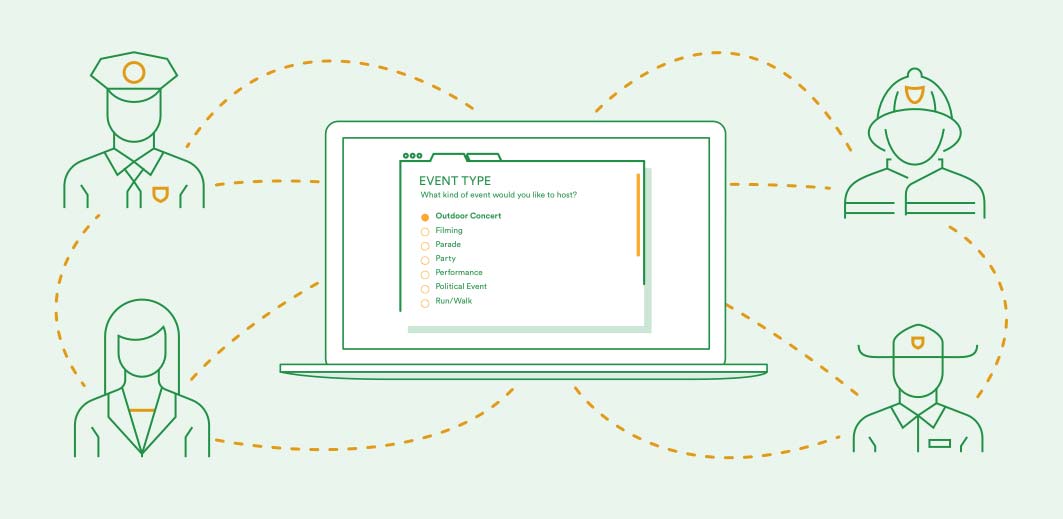Imagine the adrenaline surging through the streets of Boston or New York during their annual marathons. Thousands of runners, tens of thousands of spectators cheering everyone on as they snake their way through more than 26 miles of streets usually packed with cars, cyclists, and pedestrians.
Now think of all of the people responsible for everyone’s safety during the event. The police officers and EMTs stationed throughout the race, the countless transportation workers who’ve blocked off the streets seemingly overnight. The city leaders and planners devised a route that would impact as few citizens and businesses as possible.
Now think of all the permitting required to make those marathons happen.
Ensuring the proper permits, resources, and support are in place for special events requires a whole lot of collaboration across City Hall. But unfortunately, that level of collaboration is missing in most agencies, making an already complex process even more agonizing.
OpenCounter has worked with cities across the country to upgrade their special events permitting with our Special Events Portal. And those engagements have revealed a clear (though unsurprising) trend: Most issues in special events planning stem from a lack of cross-departmental collaboration, which can manifest in different ways.
Here we’ll take a look at the four most common challenges to effective collaboration that we’ve seen — and how our Special Events Portal can help solve each one for your city.
1. Departments are siloed.
Each city department often operates within their own silos — sometimes to the point that an employee in one department doesn’t know which of their counterparts in other departments is responsible for permitting. That means when it’s time to collaborate on a permit request or answer an applicant’s question, city employees don’t know which person — or even which department! — to bring to the table.
Our Solution
We resolve this sticking point by configuring our Special Event Portal’s workflow to map out the permit reviewers across every department required for approval. That means OpenCounter automatically assigns applications to the correct department based on the specific event type or location. And as one department approves a permit, the next department is notified that it’s their turn to review.
Not only do employees know whom to call when issues or questions arise, they can also track the entire approval process through the portal’s intuitive interface.
2. Staff don’t have a holistic understanding of the entire permitting process.
A familiar result of siloed departments is a lack of understanding of the end-to-end permitting process. The Health Department will know its responsibilities regarding issuing permits, but may not know the role Parks and Recreation or the Fire Department play in the same process.
Why are there such knowledge gaps when it comes to permitting? Because city departments typically never meet to discuss special events permitting in their city — let alone how to make the process better. And that approach breeds all sorts of undetected inefficiencies.
Our Solution
To foster a better understanding of the entire special events process and each department’s role, OpenCounter brings everyone to the table before configuring the portal.
Recently, for instance, in a midsized west coast city, we discovered that the Building and Planning departments were unaware of each other’s roles and responsibilities. So our Government Services team facilitated three meetings — something that had never previously happened — to address the issue. Taking this holistic approach gave everyone an awareness of the city’s special events permitting and uncovered opportunities to streamline and strengthen their operations.
3. Duplicative permit titles sow confusion.
Once we’ve brought everyone to the table, we often discover duplicative permit titles used across multiple departments. That’s because, without a holistic approach to permitting, departments could very well use overlapping nomenclature for completely different permits.
That’s precisely what happened when OpenCounter partnered with a large midwestern city. Both the Fire Department and Health Department were issuing “temporary flame” permits — but the Fire Department’s permit was for pyrotechnics, while the Health Department’s use case was for permitting temporary cooking equipment like outdoor grills. You could imagine everyone’s surprise at discovering this redundancy! (Now imagine how confusing those titles were for applicants to decipher.)
Our Solution
In the early stages of our engagement, OpenCounter will unpack and evaluate every line of your city’s municipal code to make sure these headaches are a thing of the past. We’ll work with departments to reconcile redundancies and convert opaque jargon into natural language that everyone will understand — all while maintaining the integrity and specificity of your city code.
4. A lack of clarity for applicants turns into countless questions for staff.
Because special events require many permits, it’s often not apparent to applicants which departments are involved or which one they should reach out to with their questions. Unfortunately, applicants often guess incorrectly. And if departments are siloed — remember that problem? — employees are left to field questions to which they don’t know the answer. The process of getting those answers or redirecting applicants is put squarely on City Hall’s shoulders, and that is a very time-consuming task.
Our Solution
OpenCounter’s Special Events Portal takes the guesswork out of permitting by making it clear to users — in real-time as they input details about their event — which departments are involved, what permits are required, and what information they need to provide.
So if an event plans to offer alcohol to attendants, OpenCounter automatically provides the applicant with information on how to secure approval and the contact information for that relevant department. This both streamlines the process for City Hall and makes the process transparent and intuitive for the applicant.
OpenCounter: Your Special Events Permitting Partner
Given the ways our Special Events Portal eliminates the biggest headaches when it comes to cross-departmental collaboration (not to mention how it adds transparency and efficiency to the process), it’s no wonder cities are turning to OpenCounter to take their special events permitting to the next level. But we aren’t a one-trick pony — we can help strengthen every aspect of your permitting operations.
That’s why OpenCounter has become the virtual permitting counter for municipalities across the country — from Cincinnati to Miami and from Detroit to Fort Worth. Our suite of portals makes it easy for everyone to understand the permit discovery process, which permits they need, how much each of them costs, and how to apply.
Plus, our products are backed by OpenCounter’s in-house team of public sector experts — people with deep knowledge of all things zoning, permitting, and licensing. We know how complex every single one of these processes is, the headaches and inefficiencies they’re causing your team, and we know exactly how to ease those burdens. More specifically, we understand why special events permitting is a special kind of headache, and we know how to alleviate it.
We don’t just offer a great product — we deliver great service, too.
See for yourself how OpenCounter can modernize your zoning, permitting, and licensing systems, leading to greater efficiency and happier citizens. Get in touch and schedule a discovery session with us today.



